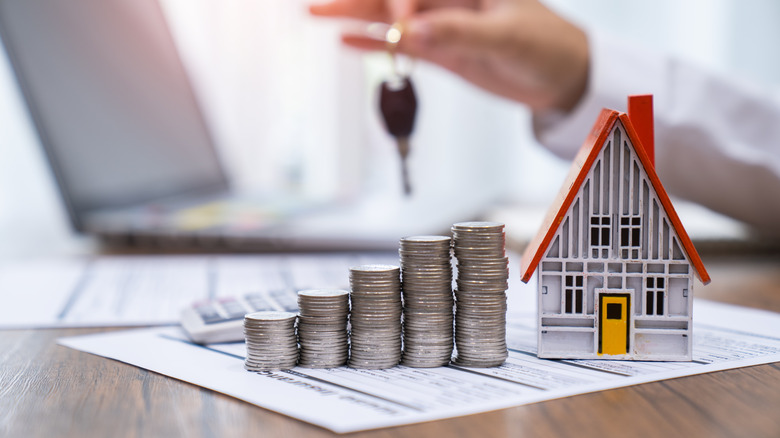What A 'Strong' Economy Means For The Housing Market
When people say the economy is "strong," they usually mean that things look good on paper — rising wages, low unemployment rates, and so on. In other words, more people are working and making a decent income. And when people feel confident about their finances, the first thing many think about is buying a home. But there's a catch: Rising demand usually leads to a surge in prices. As a result, many potential buyers are left behind.
From a wider perspective, a healthy economy often translates into increasing consumer confidence in the real estate market. This means more potential homeowners looking to buy their first property or upgrade to a bigger house. Real estate developers love a strong economy, too. When people start house-hunting, construction companies launch more projects to meet demand. Lenders also loosen up a bit, since borrowers look more stable. As credit becomes more accessible, it drives housing demand. Then, there's the investment side. In a growing economy, real estate looks like a safe bet. People buy homes not just to live in, but as assets that can appreciate in value. This creates the "wealth effect." Homeowners feel richer on paper and tend to spend more in other areas, leading to further growth.
Of course, all this sounds great until you realize there's a tipping point. Once prices rise too fast or too high because of the increasing demand, regular buyers start getting pushed out. And when that happens, the so-called "strong" economy starts showing cracks in the housing market. In fact, 2025 real estate trends show that prices were 27% higher earlier this year than they were five years ago.
The downside of a strong economy
A booming economy isn't always smooth sailing for homebuyers. One of the first things central banks do in response to economic strength is raise interest rates. That makes mortgage borrowing more expensive and can leave many buyers out. Rising mortgage rates tend to hinder home-purchase activity, especially among low-income buyers — even if credit is more accessible.
It's also worth mentioning that home prices often climb faster than wages. In the U.S., housing affordability is currently at historically low levels, partly because borrowing costs and property valuations have outpaced income growth. For first-time buyers, this can be a major issue. They often fall behind when investors and higher-income buyers dominate the market. This brings us to an important point: investors. When the economy looks strong, real estate becomes a magnet for capital. Domestic and foreign investors often buy up properties to park money or flip for profit. These investments tend to push up prices, especially in the lower-tier segments that would otherwise be affordable to new buyers. And if speculative buying gets out of hand, it can inflate housing bubbles that eventually burst when conditions change, such as when interest rates climb too high or the economy cools off.
So, while a strong economy brings opportunities, it can also be problematic. Rising interest rates, affordability gaps, and speculative buying can all overshadow the market heat. When growth, lending, and housing supply move in sync, everyone benefits. But when one of those factors gets out of line, and trends have repeatedly shown that it often does, the housing market can quickly create barriers to entry for many, disrupting real estate equality.

